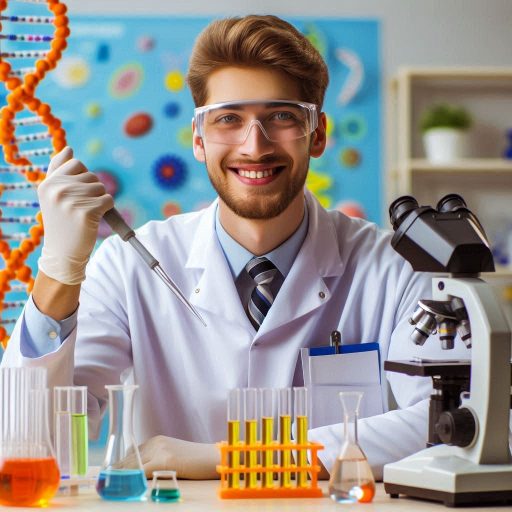Introduction
Geneticists and genetic counselors both contribute significantly to the field of genetics, though their roles and responsibilities differ.
A geneticist primarily focuses on research and the scientific understanding of genes, heredity, and genetic disorders.
They conduct laboratory experiments, analyze DNA, and investigate how genes influence human health and disease.
Their work often leads to the discovery of new genetic conditions, the development of therapies, and advancements in genetic technology.
In contrast, genetic counselors work closely with patients and their families.
They provide personalized guidance by interpreting genetic test results, assessing risks of inherited conditions, and offering emotional support.
Genetic counselors help individuals understand complex genetic information, enabling them to make informed decisions about their health or family planning.
Their expertise is particularly valuable in prenatal counseling, cancer genetics, and rare disease support.
While geneticists focus on advancing scientific knowledge and diagnostic processes, genetic counselors bridge the gap between science and patient care.
Together, they contribute to better health outcomes and the development of personalized medicine.
Education and Training
Educational Requirements for Geneticists
- Undergraduate Degree: Geneticists begin their academic journey with a bachelor‘s degree in biology, genetics, or a related field.
This foundational education provides a deep understanding of biological sciences, including molecular biology, biochemistry, and cell biology. - Advanced Degrees: After obtaining a bachelor‘s degree, aspiring geneticists must pursue a PhD in genetics or a related field.
This involves several years of research in areas such as population genetics, genomics, or molecular genetics.
A PhD equips them with the advanced knowledge and skills necessary for conducting independent research and developing new genetic technologies. - Postdoctoral Training: Following a PhD, many geneticists undergo postdoctoral training.
This phase involves specialized research, typically within academic or medical institutions, further enhancing their expertise. - Optional Medical Degree: Some geneticists choose to attend medical school to become medical geneticists.
This additional education allows them to diagnose and treat genetic disorders directly, combining clinical practice with research.
Training Programs for Genetic Counselors
- Bachelor‘s Degree: Like geneticists, genetic counselors begin with a bachelor‘s degree, usually in biology, psychology, or a related health science field.
This diverse foundation provides insight into both the scientific and psychological aspects of genetics. - Master‘s Degree in Genetic Counseling: Genetic counselors must complete a specialized master‘s degree in genetic counseling.
These programs typically last two years and focus on medical genetics, counseling techniques, and ethics in healthcare.
Training includes both classroom education and clinical rotations. - Clinical Rotations: During their master’s program, genetic counselors participate in clinical rotations.
These hands-on experiences allow them to work directly with patients, interpreting genetic tests and discussing genetic risks.
The practical experience is crucial for honing their counseling and communication skills. - Certification and Licensure: After completing their master‘s degree, genetic counselors must pass the American Board of Genetic Counseling (ABGC) certification exam.
Many states also require licensure to practice, ensuring that counselors meet professional standards.
Summary of Key Differences
- Geneticists typically pursue a PhD and may continue with postdoctoral research or a medical degree.
- Genetic counselors complete a master’s degree program and require certification and licensure to practice.
Both professions require rigorous academic preparation, but geneticists focus more on research, while genetic counselors emphasize patient interaction and guidance.
Read: Profiles in Success: Leading Chemists of the 21st Century in the US
Job Responsibilities
Geneticist: Tasks and Responsibilities
Geneticists focus on studying genes, their functions, and their impact on health.
They analyze genetic data and conduct research to understand genetic disorders.
Here are some typical tasks for geneticists:
- Research: Geneticists perform experiments and research to discover how genes contribute to diseases.
- Data Analysis: They analyze DNA samples and other genetic materials to identify mutations or abnormalities.
- Diagnostics: Geneticists often work in labs, diagnosing genetic conditions in patients using advanced tools and techniques.
- Treatment Development: They contribute to the development of new treatments for genetic diseases, including gene therapies.
- Collaboration: Geneticists collaborate with other medical professionals to interpret data and provide insights for patient care.
- Teaching: Many geneticists teach at universities or train other healthcare professionals in genetics.
- Publication: They publish their findings in scientific journals to advance knowledge in the field.
Their role is highly specialized and research-focused, impacting both clinical and scientific advancements.
Genetic Counselor: Role in Patient Care and Counseling
Genetic counselors focus on helping patients understand the implications of genetic testing.
They work closely with patients and families to guide them through complex genetic information.
Here are the key responsibilities of a genetic counselor:
- Patient Education: Genetic counselors explain genetic conditions, test results, and potential health risks to patients and families.
- Risk Assessment: They assess the likelihood of a patient inheriting or passing on genetic disorders.
- Test Interpretation: They interpret genetic test results and explain them in a way that is easy to understand.
- Emotional Support: Genetic counselors provide emotional support, helping patients cope with the psychological impact of genetic conditions.
- Family Planning Advice: They offer advice on family planning, especially for those at risk of passing on genetic conditions.
- Liaison Role: Genetic counselors act as intermediaries between patients and other healthcare providers, ensuring coordinated care.
- Ethical Guidance: They guide patients through ethical considerations, especially when dealing with sensitive genetic information.
Unlike geneticists, genetic counselors focus on patient interaction, providing both emotional and educational support.
Key Differences in Responsibilities
While geneticists concentrate on research and diagnostics, genetic counselors prioritize patient care and communication.
Geneticists work in laboratories, contributing to scientific advancements.
Genetic counselors work directly with patients, translating complex information into practical advice.
Together, geneticists and genetic counselors play crucial, complementary roles in the field of genetics, bridging research and patient care.
Read: The Life and Times of a U.S. Physicist: A Day in Detail
Focus of Work
Understanding the focus of work for geneticists and genetic counselors reveals significant differences.
Each profession plays a vital role in the field of genetics, yet their primary responsibilities diverge significantly.
Geneticists: Research and Clinical Work
Geneticists dedicate their careers to advancing knowledge in genetics.
They primarily focus on research and clinical applications of genetic information.
Their work often includes the following areas:
- Research: Geneticists conduct experiments to understand genetic variations and their implications.
They analyze DNA sequences, study gene functions, and explore hereditary diseases.
Their research contributes to scientific publications and advances in genetics. - Clinical Practice: Many geneticists work in clinical settings, diagnosing genetic disorders.
They assess patients’ medical histories and interpret genetic test results.
Their role involves recommending treatment options based on genetic findings. - Collaboration: Geneticists often collaborate with other healthcare professionals.
They work with doctors, genetic counselors, and researchers to provide comprehensive care.
This collaboration helps ensure accurate diagnoses and effective treatment plans. - Education: Geneticists educate healthcare providers and the public about genetic conditions.
They share knowledge about advancements in genetics and the implications for health and disease.
Geneticists focus on understanding the genetic basis of diseases and developing innovative treatments.
Their work often involves complex scientific methodologies and requires advanced degrees in genetics or related fields.
Genetic Counselors: Patient and Family Interaction
In contrast, genetic counselors prioritize working directly with patients and families.
Their primary responsibilities include:
- Patient Education: Genetic counselors educate patients about genetic conditions.
They explain the inheritance patterns, risks, and implications of genetic testing.
This education helps patients make informed decisions about their health. - Risk Assessment: They assess patients‘ family histories to evaluate the risk of genetic disorders.
Genetic counselors identify potential inherited conditions and provide risk estimates for family members. - Support and Guidance: Genetic counselors offer emotional support to patients and their families.
They help individuals cope with the emotional impact of genetic diagnoses.
Counselors also guide families in making healthcare decisions based on genetic information. - Testing Coordination: Genetic counselors facilitate genetic testing and interpret results.
They guide patients through the testing process and explain the implications of results.
Their goal is to ensure patients understand their options moving forward.
While geneticists focus on research and clinical applications, genetic counselors concentrate on patient care and education.
Both professions play critical roles in genetics but serve different purposes in healthcare.
The focus of work for geneticists and genetic counselors highlights key differences.
Geneticists engage in research and clinical practice, while genetic counselors prioritize patient interaction and education.
Understanding these roles helps clarify the essential contributions each profession makes to genetics and healthcare.
Read: Salary Ranges: What to Expect as a Physicist in the USA

Genetic Testing
Genetic testing plays a crucial role in understanding genetic conditions and guiding patient care.
Both geneticists and genetic counselors participate in this process, but they have distinct roles that contribute to a comprehensive approach to genetic health.
The Role of Geneticists in Genetic Testing
Geneticists are specialized medical doctors who focus on genetics.
They conduct and interpret genetic tests, providing essential insights into a patient’s genetic makeup.
Here‘s how geneticists work with genetic testing:
- Ordering Tests: Geneticists evaluate a patient‘s medical history, symptoms, and family background to determine which genetic tests are appropriate.
They consider factors such as age, health conditions, and personal concerns. - Conducting Tests: Geneticists collect samples, such as blood or saliva, from patients.
They ensure proper procedures are followed to maintain sample integrity.
Once collected, they send these samples to specialized laboratories for analysis. - Interpreting Results: After receiving results, geneticists analyze the data to identify any genetic variations or mutations.
They assess the significance of these findings in the context of the patient‘s health.
This requires a deep understanding of genetic science and the ability to apply it to real-world situations. - Providing Diagnosis: Based on the test results, geneticists diagnose genetic disorders.
They recommend treatment options tailored to the patient‘s specific genetic condition.
This may include medications, lifestyle changes, or referrals to other specialists. - Research and Development: Geneticists often engage in research to develop new tests and improve existing ones.
They stay current with advances in genetic research, which can lead to better diagnostic tools and therapies for patients.
Geneticists possess the technical expertise required to perform complex genetic tests and interpret their outcomes accurately.
Their work is critical in diagnosing genetic conditions, informing treatment options, and contributing to advancements in genetic research.
Transform Your Career Today
Unlock a personalized career strategy that drives real results. Get tailored advice and a roadmap designed just for you.
Start NowThe Role of Genetic Counselors in Genetic Testing
Genetic counselors play a vital role in the patient experience surrounding genetic testing.
They provide support and information before, during, and after testing.
Here‘s what genetic counselors do:
- Patient Education: Genetic counselors explain the purpose and process of genetic testing to patients and their families.
They discuss the types of tests available and what patients can expect during the testing process.
This education helps patients feel more informed and comfortable. - Informed Consent: Before testing begins, genetic counselors ensure that patients understand the implications of genetic testing.
They provide detailed information about potential outcomes, including risks, benefits, and limitations.
This helps patients make informed choices about whether to proceed with testing. - Interpreting Results: After tests are completed, counselors help patients understand what the results mean in layman‘s terms.
They break down complex genetic jargon into understandable language, ensuring patients grasp the implications of their results. - Discussing Implications: Genetic counselors explain the potential health, emotional, and familial implications of test results.
They help patients understand how results may impact their health and that of their relatives.
This discussion often includes risk assessment for family members.
Genetic counselors help bridge the gap between complex genetic information and patient understanding.
They ensure that patients make informed decisions regarding their health and provide ongoing support throughout the process.
Geneticists and genetic counselors have distinct but complementary roles in genetic testing.
Geneticists focus on conducting and interpreting tests, while genetic counselors emphasize patient education and support.
The relationship between geneticists and genetic counselors is essential for patient success.
Together, they empower individuals with the knowledge they need to make informed choices about their genetic health.
By understanding the unique roles each professional plays, patients can better navigate the genetic testing landscape and its potential impact on their lives.
Read: Physics Specializations: Choosing Your Path in the U.S.
Patient Interaction
Understanding the differences in patient interaction between geneticists and genetic counselors is essential.
Each profession plays a unique role in patient care.
Their level of interaction with patients significantly varies. Here are the key distinctions:
Geneticists and Their Patient Interaction
Geneticists focus primarily on diagnosing genetic conditions.
Their interactions with patients often include:
- Clinical Assessments: Geneticists conduct thorough evaluations to identify genetic disorders.
- Test Interpretation: They analyze laboratory results and explain findings to patients.
- Treatment Plans: Geneticists develop treatment protocols based on genetic information.
While geneticists may meet with patients during consultations, their primary focus remains on medical aspects.
Their interactions tend to be more clinical and less frequent than those of genetic counselors.
Genetic Counselors and Their Patient Interaction
Genetic counselors emphasize patient support and education.
They interact with patients in various ways, including:
- Detailed Consultations: Counselors meet patients to discuss family history and genetic risks.
- Emotional Support: They provide emotional guidance throughout the testing process.
- Education: Counselors explain complex genetic concepts in an understandable manner.
Genetic counselors often have longer and more frequent patient interactions than geneticists.
They focus on building relationships and addressing patients’ concerns.
Importance of Effective Communication
Effective communication is vital in both roles.
Geneticists and genetic counselors must convey complex information clearly.
The following points illustrate this importance:
- Understanding Genetic Risks: Patients need clear explanations of their genetic risks.
Geneticists and counselors must communicate these effectively. - Decision-Making Support: Patients often face difficult decisions regarding testing and treatment.
Clear communication helps them make informed choices. - Addressing Emotional Concerns: Genetic testing can be overwhelming.
Counselors, in particular, must provide emotional support through effective dialogue.
Geneticists and genetic counselors differ significantly in patient interaction.
Geneticists focus on diagnosis and treatment, while counselors prioritize support and education.
Both professions require excellent communication skills to effectively engage with patients.
They must convey complex information clearly to support patients through their genetic journey.
By understanding these key differences, patients can better navigate their healthcare options.
Each role complements the other in providing comprehensive care.
Effective collaboration between geneticists and counselors ultimately enhances patient outcomes.
Career Path
Understanding the career paths for geneticists and genetic counselors highlights the opportunities in each field.
Both professions focus on genetics, but they offer different roles and growth potential.
Career Paths for Geneticists
Geneticists pursue diverse career paths, often involving research, clinical work, or industry positions.
Here are some common options:
- Research Scientist: Geneticists conduct research to understand genetic diseases and develop new therapies.
They often work in academic institutions or research facilities. - Clinical Geneticist: Clinical geneticists diagnose and manage genetic disorders.
They work closely with patients, families, and healthcare providers to offer comprehensive care. - Molecular Geneticist: This role involves studying DNA, RNA, and protein functions.
Molecular geneticists often contribute to genetic testing and gene therapy developments. - Genetic Epidemiologist: Genetic epidemiologists study the role of genetics in health and disease.
They analyze genetic data to identify risk factors for various conditions. - Pharmaceutical or Biotechnology Industry: Many geneticists work in the pharmaceutical industry, focusing on drug development and genetic therapies.
They collaborate with scientists and clinicians to create innovative treatments. - Academia: Some geneticists pursue academic careers, teaching and mentoring students.
They also conduct research and publish findings in scientific journals.
Each path offers unique opportunities for specialization and advancement, allowing geneticists to shape their careers according to their interests.
Career Paths for Genetic Counselors
Genetic counseling offers a distinct yet complementary career path.
Counselors help individuals understand genetic conditions and make informed decisions.
Here are potential career paths in genetic counseling:
- Clinical Genetic Counselor: These professionals work directly with patients.
They assess risk factors, provide education, and support families facing genetic issues. - Prenatal Genetic Counselor: Prenatal counselors specialize in guiding expectant parents through genetic testing options.
They help interpret results and discuss implications for the family. - Pediatric Genetic Counselor: Pediatric counselors focus on children with genetic disorders.
They provide support and resources to families navigating complex diagnoses. - Cancer Genetic Counselor: Cancer counselors assess family histories of cancer.
They educate patients about genetic testing and preventive measures for hereditary cancers. - Research or Academic Positions: Some genetic counselors engage in research or teach at universities.
They explore new developments in genetics and train future professionals. - Industry Roles: Genetic counselors can work in biotechnology or pharmaceutical companies.
They help develop genetic tests and therapies, providing insights on patient needs.
Growth and Specialization
Both geneticists and genetic counselors enjoy significant growth potential in their careers.
- Geneticists can specialize in emerging fields like gene therapy or pharmacogenomics.
- Genetic counselors can advance to leadership roles or specialize further in niche areas.
Pursuing advanced degrees or certifications can enhance job prospects and promote career advancement.
Overall, both professions contribute significantly to the field of genetics, offering fulfilling and impactful career opportunities.
Learn More: How to Publish Research Papers in Astronomy Journals
Ethical Considerations in Genetics
Geneticists and genetic counselors both encounter ethical dilemmas in their respective roles.
Understanding these challenges is crucial for navigating the complexities of genetic research and patient care.
Here, we explore the ethical considerations that geneticists face and how genetic counselors address ethical issues.
Ethical Dilemmas Faced by Geneticists
- Informed Consent: Geneticists often deal with obtaining informed consent from research participants.
They must ensure that participants understand the nature of the research and potential risks involved. - Confidentiality: Maintaining confidentiality is critical in genetic research.
Geneticists must protect sensitive information about participants, especially regarding their genetic data. - Genetic Discrimination: Geneticists may face ethical issues related to genetic discrimination.
They must be aware of the implications of their research findings on participants‘ insurance and employment opportunities. - Dual Use of Research: Genetic research can lead to dual-use dilemmas.
Geneticists must consider how their discoveries might be used for harmful purposes, such as bioweapons or unethical genetic enhancements. - Access to Genetic Technologies: Ethical questions arise concerning who has access to genetic technologies.
Geneticists should advocate for equitable access, ensuring that all individuals benefit from advancements.
How Genetic Counselors Navigate Ethical Issues
Genetic counselors play a vital role in addressing ethical dilemmas related to patient care.
They guide individuals through complex decisions involving genetic information.
Transform Your Career Today
Unlock a personalized career strategy that drives real results. Get tailored advice and a roadmap designed just for you.
Start Now- Patient Autonomy: Genetic counselors prioritize patient autonomy.
They empower clients to make informed decisions regarding genetic testing and potential outcomes. - Non-Directive Counseling: Genetic counselors practice non-directive counseling.
They provide information without imposing their values, allowing clients to make personal choices about their health. - Risk Communication: Effective risk communication is essential.
Counselors explain the implications of genetic test results, helping patients understand the potential impact on their lives. - Cultural Sensitivity: Genetic counselors must navigate cultural sensitivities.
They respect diverse beliefs and values while discussing genetic information and testing options. - Support for Families: Genetic counselors offer support to families facing genetic challenges.
They address the emotional aspects of genetic conditions and help families understand their options. - Advocacy for Patients: Counselors often advocate for patients‘ rights.
They ensure that patients have access to necessary resources and support, promoting ethical practices in genetic testing. - Ethical Training: Genetic counselors undergo ethical training.
This preparation equips them to handle ethical dilemmas effectively and promotes best practices in patient care.
Both geneticists and genetic counselors navigate complex ethical landscapes in their work.
Geneticists face challenges in research ethics, while genetic counselors focus on patient care ethics.
Understanding these differences is essential for promoting ethical practices in genetics.
Learn More: Microbiology Research: Key Areas and Trends
See Related Content: Government Roles for Soil Scientists
Conclusion
Geneticists and genetic counselors have distinct but complementary roles in genetics and healthcare.
Geneticists primarily focus on research and diagnosing genetic disorders.
They analyze DNA and study genetic conditions, contributing significantly to scientific advancements.
Their work often involves conducting laboratory tests, interpreting complex genetic data, and developing new treatments for genetic diseases.
On the other hand, genetic counselors provide essential support and education to patients and families.
They help individuals understand genetic testing results, explain the implications of those results, and guide families through the emotional aspects of genetic information.
Together, these professionals enhance patient care and improve health outcomes.
Geneticists generate knowledge that drives diagnosis and treatment, while genetic counselors translate this knowledge into practical advice.
By working together, geneticists and genetic counselors empower individuals to make informed decisions about their health.
This partnership is crucial in navigating the complexities of genetic information, ensuring patients receive comprehensive care.
Understanding their differences highlights their importance in the genetic landscape and underscores the value they bring to the healthcare system.
[E-Books for Sale]
The Big Book of 500 High-Paying Jobs in America: Unlock Your Earning Potential
$19.99 • 500 High-Paying Jobs • 330 pages
Explore 500 high-paying jobs in America and learn how to boost your career, earn more, and achieve success!
See All 500 High-Paying Jobs of this E-Book
1001 Professions Without a Degree: High-Paying American Jobs You Can Start Now
$19.99 • 1001 Professions Without a Degree • 174 pages
Discover 1001 high-paying jobs without a degree! Unlock career tips, skills, and success strategies for just $19.99!




